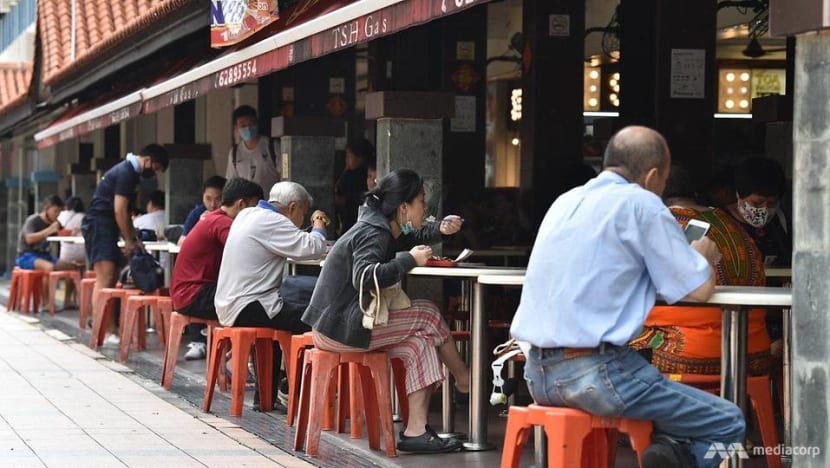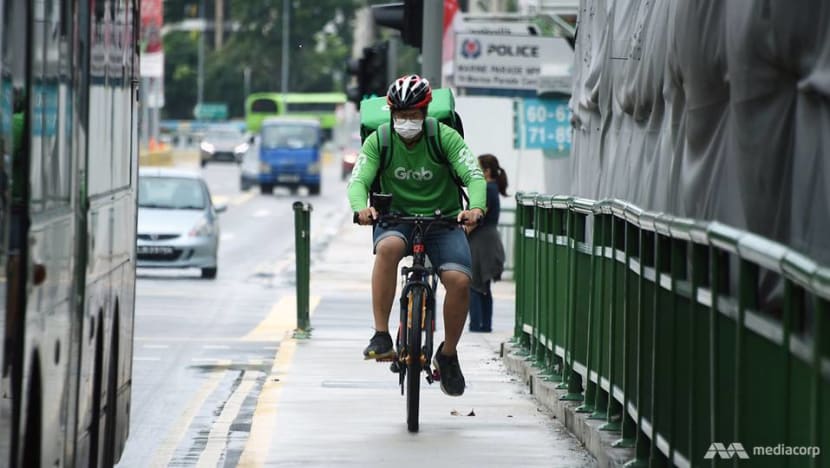commentary Commentary
Commentary: Why some miss their regular kopi pit stop after dining-in restrictions kicked in
That coffee break used to allow essential workers and parents some distance and recuperation, says mum June Yong.

A coffee shop in Toa Payoh sees the return of lunchtime crowds on Jun 19, 2020, the first day of Phase 2 of Singapore's reopening. (Photo: Jeremy Long)
SINGAPORE: Going down to the coffeeshop or a nearby cafe used to mark a midpoint in the day for me, a good half hour away from my three kids to catch my breath and hold onto my sanity.
Since Phase 2 (Heightened Alert) kicked in and schools shifted to HBL in mid-May, mums like me have been feeling the heat from caring for our children 24/7, while also coping with an erosion of personal space within and outside the home.
Since the June holidays began last week, we’ve also had to scramble to put together some semblance of structure to the children’s mostly empty days.
But the restrictions that have kicked in have also meant that dining-in is no longer allowed. I do miss that routine of heading downstairs for my teh c xiu dai (tea with evaporated milk and less sugar) and sitting for a while.
READ: Commentary: Hawkers and food delivery riders deserve more appreciation
READ: Commentary: Can the F&B industry and food delivery platforms cope better this time around?
The days are starting to blend together, and it’s a struggle to focus on getting work done.
“I can’t sit down and relax for an extended period of time at home. Some kid always needs me,” commiserates a friend who is a stay-home mother of four young girls.
“Being at a cafe means I get to be an adult and read and unwind, journal and eat something nice (which I don’t have to share). It’s also a rare chance for me not to have to meet anyone else’s needs at least for a couple of hours.”
For another friend who used to enjoy a spot of me-time at her local coffeeshop when everyone else was still in bed, such mental and physical breaks provide her quiet moments for reflection, setting the tone for the day that she says sometimes helps to improve her relationships at home.
PARENTING BURNOUT
Psychologist John Duffy, author of Parenting the New Teen in the Age of Anxiety, identifies a hidden form of labour specific to mothers – “emotional labour”.

In a CNN commentary, he defines it as “the ability and willingness to gauge the emotional temperature of the home – who is struggling, who may be nearing a boiling point, who needs some time alone, who might need therapy – that has kept our households reasonably sane for the length of the pandemic.”
Emotional labour, which stands separately from managing the home, is “esoteric, ongoing and endlessly taxing. And the emotional labour in most every household tends to fall squarely on moms.”
WATCH: Home alone with Daddy for three days
In pandemic times, with families stuck in small spaces, caregiving can be a slippery slope to burnout if we don't take sufficient steps to rest.
“Taking care of yourself,” according to the American Psychological Association, “helps to keep your mind and body primed to deal with situations that require resilience.”
In an interview last year when the circuit breaker was first pulled, Dr Lim Boon Leng, a psychiatrist at Dr BL Lim Centre for Psychological Wellness, suggests that mums carve out time for themselves in the family timetable or establish areas out of bounds to the kids.
For many, a short break away from the family could help us feel calmer and more emotionally regulated, at a time when parental stress levels continue to rise and along with it, irritability and resentment within the home.
READ: Commentary: Surviving home-based learning in the long haul may require parents to dial back on kiasuism
READ: Commentary: Parents play an outsized role in academic stress children face
SELF-CARE CAN MAKE US BETTER PARENTS
To be sure, the loss of the kopi pit stop affects everyone, and some essential workers might feel the pain sharply.
An affordable and accessible everyday luxury for some, it can be a critical juncture for others taking a break between gigs.
People constantly on the move, such as food deliverers, taxi and private car drivers, contractors and insurance agents are going to feel the displacement the most.

At the coffeeshop I escaped to each day before these new restrictions, some of them could be spotted at lunchtime sitting and resting. Now they eat in their vehicles or at a void deck.
Thankfully, the Government saw their need and quickly carved out spaces in community centres for them to sit and have their meals at a safe distance. Attention has also been paid to establishing rest places for low-wage workers before the pandemic, with funding to set up such areas available.
I would also argue that just as essential workers need a dedicated rest area, so do mums. You may wave this off as self-indulgence, but self-care makes us better parents.
READ: Commentary: Worries over COVID-19 situation are taking a mental toll on Singapore
Self-care habits can be small, like catching up with a good friend or enjoying a book at bedtime by ourselves. The rest or relaxation helps us stay healthy, emotionally regulated and at the top of our game.
The University of Chicago’s Centre for the Study of Social Policy says self-care for parents is a critical resource. Whether it is yoga, quiet journaling, or a coffee with a friend, self-care reduces stress and enhances our sense of wellbeing.
These meet our needs, whether physical, emotional, spiritual or social and help us be in a better place to care for those of our spouse and children.
For caregivers of children with special needs or elderly parents, the practice of taking regular time-off is all the more crucial.
("Hawkers are not stupid or stubborn." Find out why KF Seetoh says it will take more than hawkers embracing deliveries and going digital to save Singapore's food culture on CNA's Heart of the Matter podcast.)
PRACTISING GOOD EMOTIONAL HYGIENE
I know I shouldn’t lament the loss of dining-in privileges at my local coffeeshop too much, after all the situation in Singapore remains very much under control.
We are not in a full lockdown, and we can still step out for a jog, a walk, or to do a grocery run. Malls and shops remain open. My husband also tends to the kids when I need a break.

Now, I still go down on some days to grab a takeaway cuppa but instead of sitting at the coffeeshop, I wander off to find an empty park bench.
It may just be 15 minutes of stillness, but it is a cocoon of calm in such unsettling times.
COVID-19 may have warped our sense of time and shrunk our sense of space. It may have even hampered our ability to look ahead and make plans for the future.
But what it has not taken away is our ability to breathe and live within the everyday.
As we’re all experts in physical hygiene now, so we should become in emotional hygiene – especially considering the long bumpy road ahead for this pandemic.
READ: Commentary: Five pandemic lessons we have learnt that should tide us over any surge in cases
READ: Commentary: It will be a waste if parents don’t keep flexible work arrangements
CHERISHING WHAT WE HAVE NOW
We may have lost a lot in terms of freedom and normalcy, but the good news is we’re adapting and coping alright in our own unique ways.
The friend who said she misses her early morning me-time is now compensating with longer trips to the supermarket.
Some of us are also making the effort to call our loved ones more often, just to check in and find out if they’re okay.
I find myself looking for excuses to make contact, by delivering food to friends, or picking up delicious bakes from them.
READ: Commentary: Paying it forward and how being a good neighbour can go a long way
READ: Commentary: Cure to burnout requires a pervasive culture of rest
Our contact with family and friends may be shorter and more transient than before, but even these can make a difference.
While we look forward to the day when restrictions are relaxed and we can dine out once again, whether solo, in pairs or in small groups, perhaps there are already small pleasures we can relish now.
As a mummy-friend of mine quipped after I dropped by her place last week, “I guess one can go a long time without contact but it only takes a physical meetup to make you realise how precious that is.”
The same goes for our first coffee cup once dining in at hawker centres is allowed again.
June Yong is a mother of three, an educational therapist and owner of Mama Wear Papa Shirt, a blog that discusses parenting and education in Singapore.












